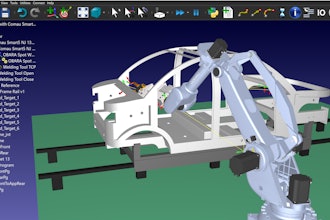
After a tumultuous two years, the manufacturing industry is building back fast. However, constant market challenges, such as labor shortages and supply chain delays, continue to cloud the overall industry outlook, reducing operational efficiency and preventing business growth. Competing in this new market demands business agility and innovation which can only be achieved by leveraging technology to enable flexibility and instill resiliency.
Today, we are seeing more solutions emerge to help combat workforce disruptions, and industry leaders are prioritizing implementing technology to strengthen their business. In fact, according to Fictiv’s 2022 State of Manufacturing Report, over 90 percent of industry leaders responded that they are using or implementing digital manufacturing technology.
To better understand how manufacturers can turn risks into advantages and capture growth, we must take a look at the solutions manufacturers are tapping into today and the opportunities they present to improve operations in the wake of various economic challenges.
Enterprise Resource Planning
More than ever, manufacturers are depending on foundational process management solutions, like an enterprise resource planning (ERP) solution, to help efficiently manage and maintain business operations remotely and securely. According to ECI Software Solution’s most recent State of SMB Digital Transformation report, 70 percent of manufacturers use an ERP solution to drive their day-to-day operations, and nearly 95 percent say that their ERP helped them manage the impacts of the pandemic.
By implementing an effective ERP solution, it enables manufacturers to have the flexibility they need to navigate complex operations pertaining to supply chain and inventory logistics, tracking material movements and automating routine tasks.
Cloud-based ERP solutions also play a critical role in allowing new levels of resilience, flexibility and cybersecurity, as remote and hybrid work arrangements are here to stay. In fact, cloud computing adoption has rapidly advanced since the start of the pandemic, with 94 percent of all enterprises now using cloud-based services, according to CloudWards.
Manufacturers can put a spotlight on these advanced technology solutions, and the career mobility that comes with these solutions. This can include cloud-based applications that allow for reliable, secure, hybrid and flexible work models to further attract and retain employees.
AI & Machine Learning
The integration of artificial intelligence (AI) and machine learning (ML) is another solution to help manage the labor shortage. Using an intelligent ERP solution that includes automation tools allows manufacturers to achieve new levels of efficiency through eliminating the need to complete repetitive tasks and enabling individuals to focus on more valued-added efforts.
These intelligent systems can also generate more powerful business data that can be transferred into actionable insights for process improvements. For example, through machine intelligence, businesses can connect the robust data in their ERP systems directly with real-time machine performance information, which can then be sent out to the user via their ERP system, making it more consumable.
Machine Intelligence
When gathering machine information and analyzing that data to make accurate business decisions, manufacturers tend to face challenges—which is a roadblock to success in our data-driven world. As mentioned, by integrating a machine intelligence platform, manufacturers can combine the data from their ERP systems with real-time machine performance information to monitor and improve operational performance.
This creates visibility at an actionable level, resulting in business operations running more effectively and enabling manufacturers to capitalize on the real-time information needed to improve shop floor performance. Machine intelligence platforms also enable machine operators and managers to connect using simple, intuitive interfaces, which helps prevent errors from occurring and avert defects throughout the production process.
Automated systems can also analyze data in real-time and trigger actions that help reduce downtime, prevent the chances of failure and improve output delivery. Overall, machine intelligence allows manufacturers to gain machine data insights, improve equipment effectiveness and decrease downtime by leveraging machine intelligence to run business operations more effectively.
Business Intelligence
Business intelligence platforms are another solution to increase manufacturers bottom lines by automating their systems and reducing manual data entry and analysis. Through integration with an ERP solution, business intelligence enables manufacturers to make faster, more proactive business decisions. Business intelligence provides manufacturers with the tools needed to create and display real-time dashboards based on their ERP data.
Through real-time data capabilities, manufacturers can be alerted when there is a problem or delay, allowing them to coordinate an alternative solution with other suppliers and vendors. This access to real-time data also enables manufacturers to be better prepared for future operations, manage costs and extend overall functionality and data collection within their ERP solution. Ideally, this supports smarter, better-informed business decisions and enriches the customer experience.
When implementing a business intelligence platform, manufacturers can improve productivity, supply chain management, inventory control and quality control.
With the ongoing market challenges and evolving customer expectations, it has become critical that manufacturers understand and harness the powerful disruptive technologies available today and transform them into agile and adaptable organizations. Intelligent ERP solutions can help manufacturers accomplish more with fewer resources and gain a competitive advantage during times of high disruption and uncertainty. Manufacturers cannot afford to miss out on business opportunities due to an outdated tech stack.
Now is the time to invest in technology to turn risks into advantages and capture growth.






















